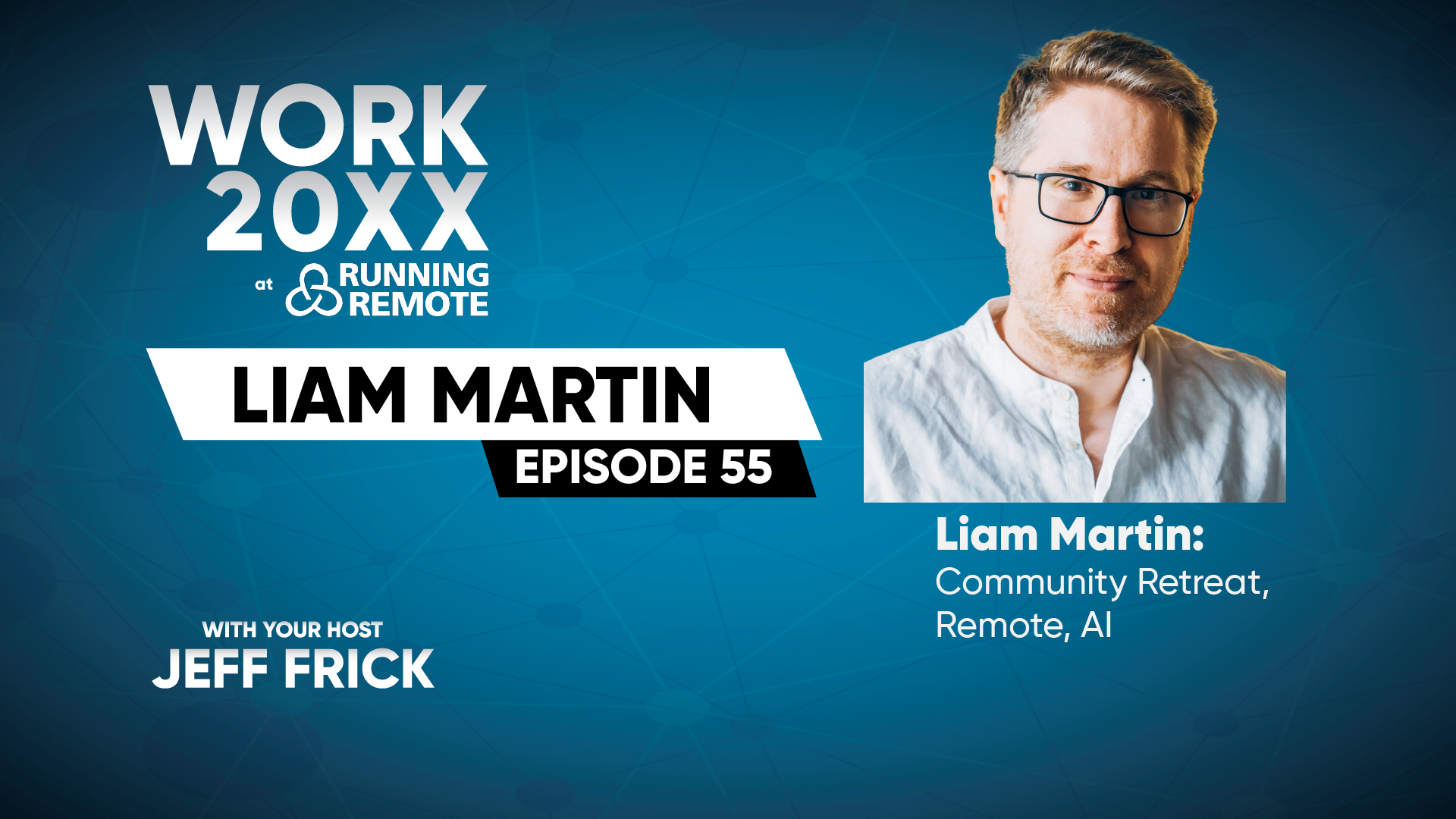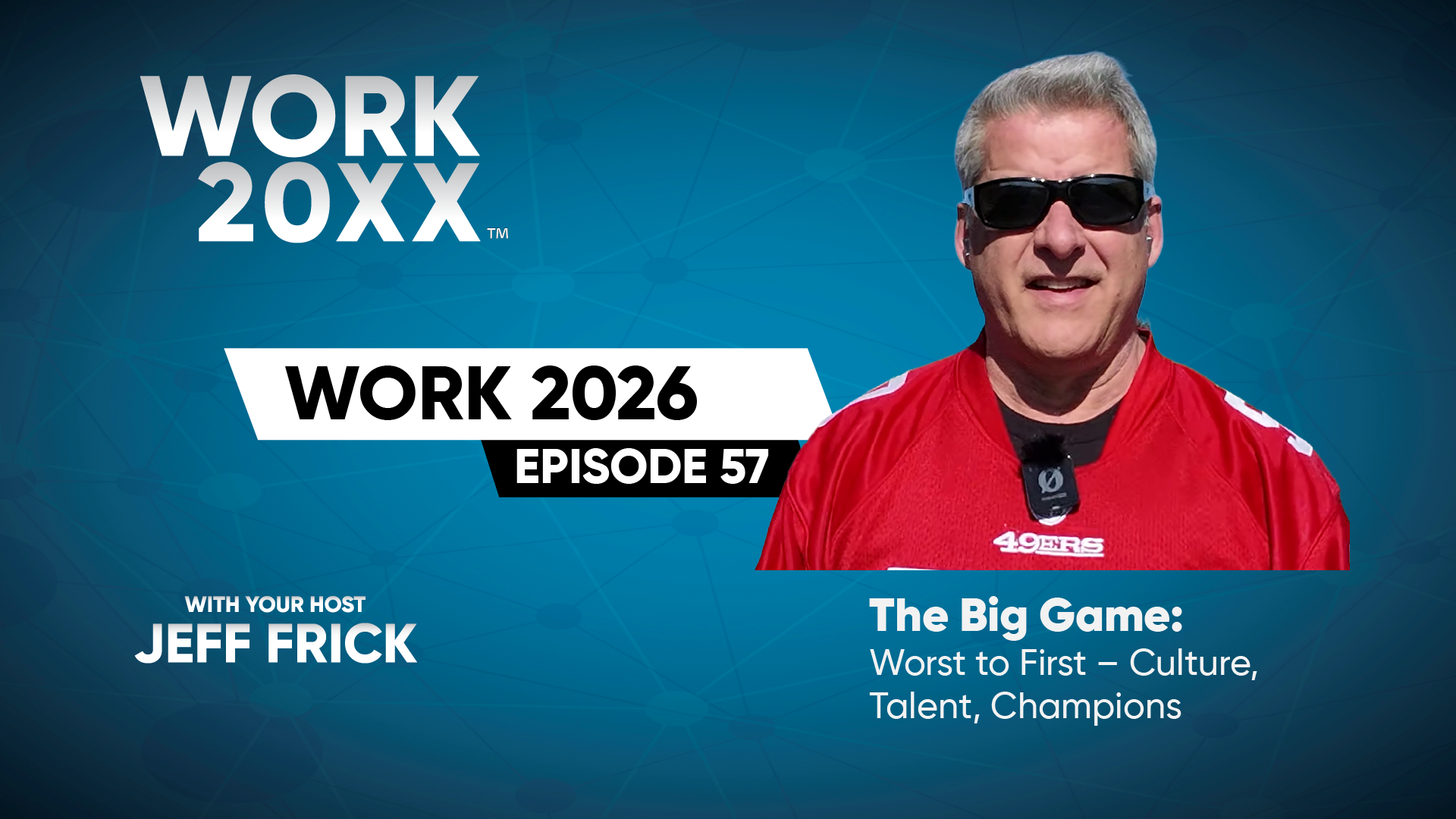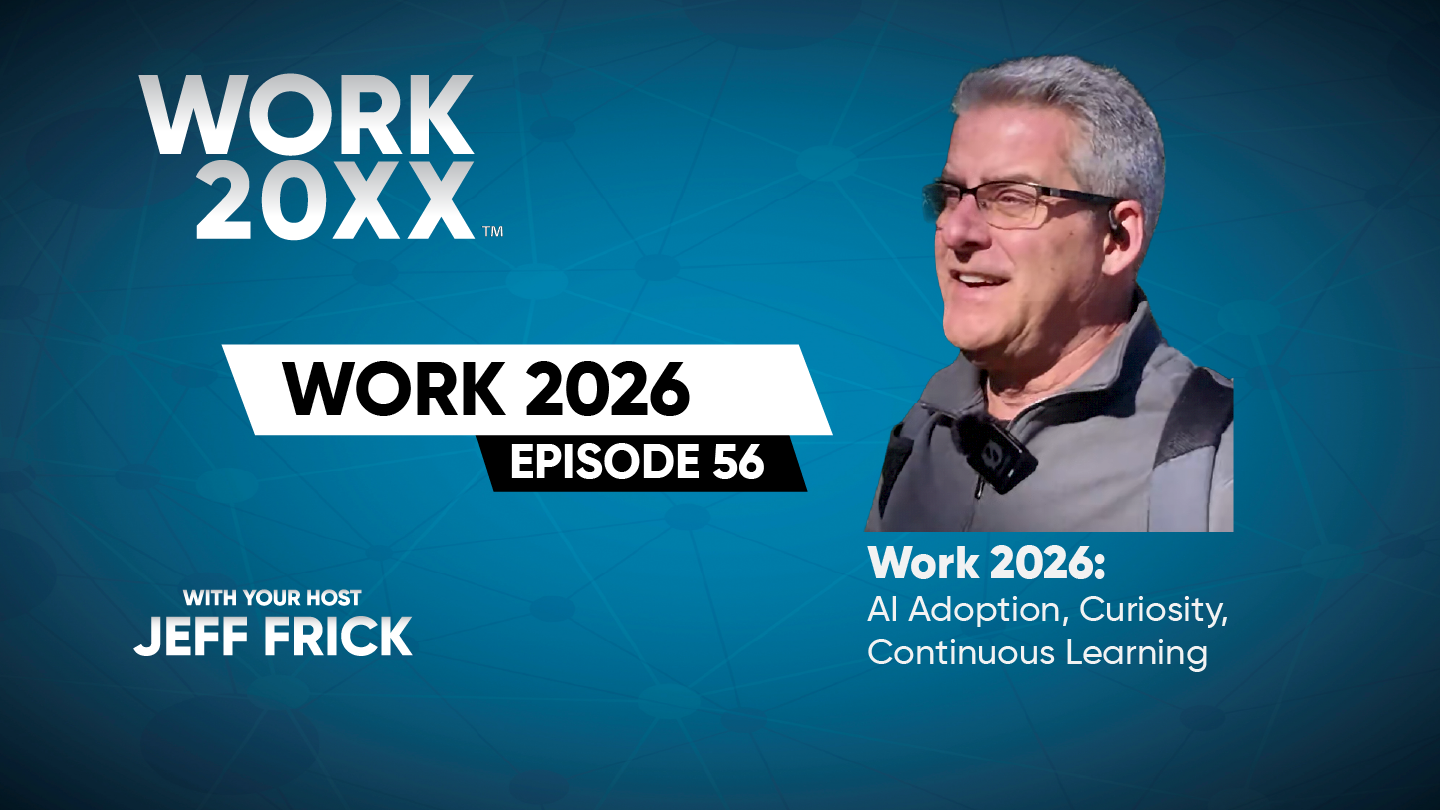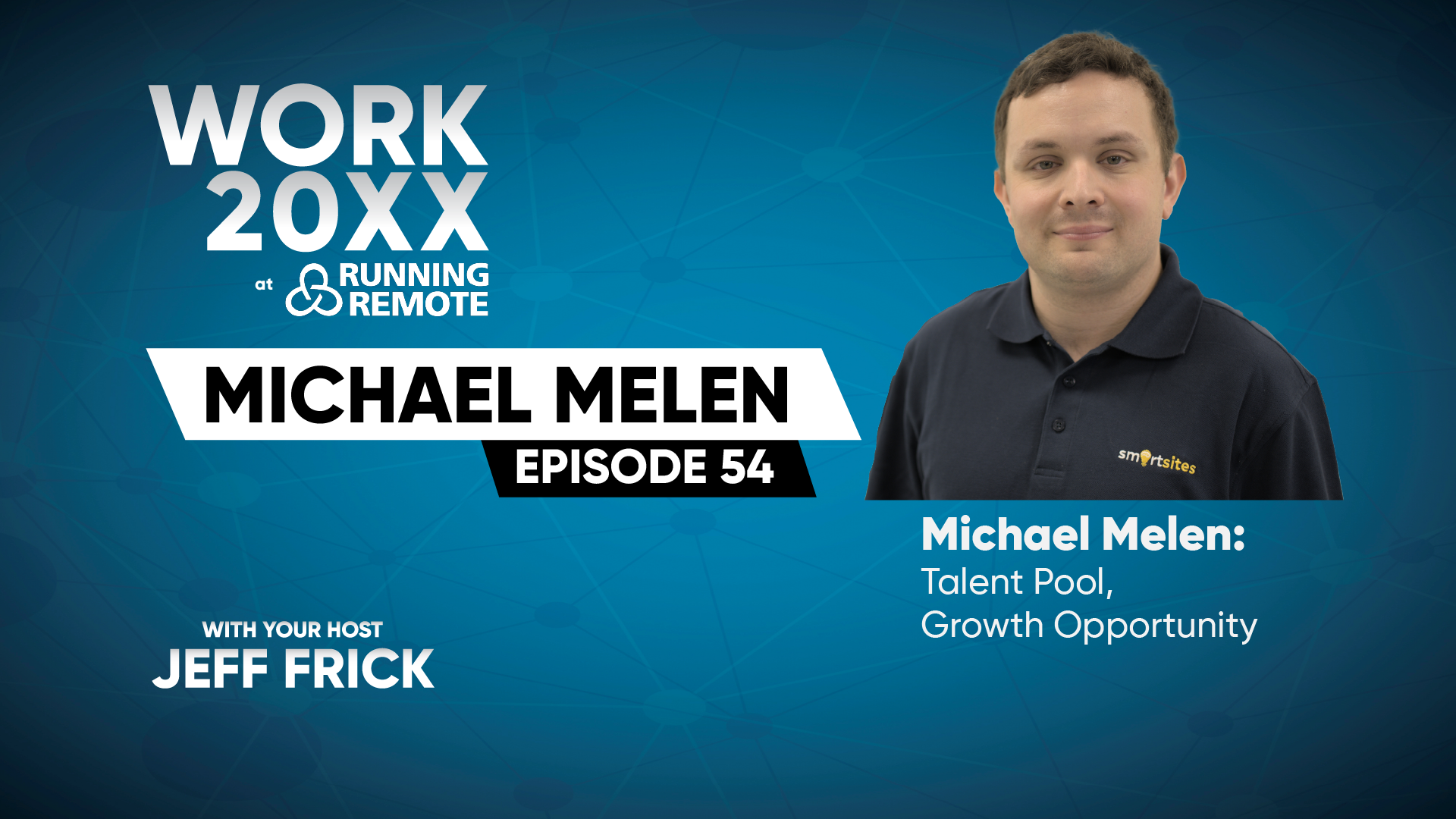Liam Martin: Community Retreat, Remote, AI | Work 20XX Ep55

Liam Martin: Community Retreat, Remote, AI | Work 20XX Ep55
When you have global talent utilizing artificial intelligence, it’s going to be a Cambrian explosion of new companies, organizations, and ways to work ... One word, freedom. More freedom for everyone to be able to work however they want, whenever they want. ... When you have the infrastructure to say “I’m not going to hire the best person in Austin. I’m going to hire the best person.” ... Someone that can use AI effectively is probably ten times more effective than someone that can’t. - Liam Martin
Liam Martin shared his full circle moment with me at Running Remote, almost 5 years to the day he was forced to cancel Running Remote’s last visit to Austin, April 2020. With prior stops in Lisbon and Montreal, Running Remote’s return to Austin was a community fest.
Remote first organizations focus more on in-house retreats than anyone outside of the actual travel industry. Industry leaders needed their own retreat. And Running Remote was born in 2018.
After the reflection, the conversation turned to the future, and the intersection of remote management practices, AI adoption, and the impact of hiring the ‘best for the job’ AI proficient talent, regardless of location.
Please join me in welcoming Liam Martin to the Work 20XX Podcast.
Editor’s Note: Recorded 2025-April-30 at the Running Remote conference in Austin, Texas.
Special thanks to Liam, Egor, Ana, and Team Running Remote.
Liam Martin: Community Retreat, Remote, AI | Work 20XX podcast with Jeff Frick Ep55 from Running Remote 2025 Austin
Episode Transcript
Liam Martin: Community Retreat, Remote, AI | Work 20XX podcast with Jeff Frick Ep55 from Running Remote Austin 2025
English Transcript
© Copyright 2025 Menlo Creek Media, LLC, All Rights Reserved
Cold Open:
Okay, then we'll go here.
Three, two, one.
Jeff Frick:
Hey welcome back everybody, Jeff Frick here, coming to you from Running Remote in Austin, Texas. I'm not in the home office. I'm not in the home studio for this very special edition of Work 20XX. I was super excited to get together with the folks from Running Remote. And they were so gracious to invite us down to talk to the leaders that are here. Because this is ground zero for the future of work. Because like I said before, things that are effective in helping run remote teams are the same types of behaviors and processes and procedures that help you run any team, whether they're hybrid, distributed, remote, on-prem, whatever. So we're excited to have one of the organizers of this thing to give us kind of the rundown. My next guest, Liam Martin, the co-organizer of Running Remote. And he's been the emcee. He kicks off every day, closes every day. So, Liam, great to see you.
Liam Martin:
Great for being here. I am very tired, but that's actually the best time to be able to do a podcast like this because usually I get very honest.
Jeff Frick:
Yeah, well, exactly. So one of the podcast tricks I'll teach you is all the good stuff, as you said, usually comes at minute 35 to 50.
Liam Martin:
Right.
Jeff Frick:
Because people are tired. They've used up all their canned stuff. The PR people have gone home and that's when you get to the good stuff.
Liam Martin:
Exactly.
Jeff Frick:
But you've been working hard, so we don't have to go for 50 minutes to get to the good stuff.
Liam Martin:
Appreciate it.
Jeff Frick:
For folks that aren't familiar with Running Remote, give us a little bit of the history. How did it get started? How long has it been around? What's kind of the story?
Liam Martin:
So Time Doctor, which is the SaaS business that we run, we had a problem in 2018. We had about 100 people, and we were trying to figure out how to get to 500 people, how to get to 1,000 people, how to get to 5,000 people.
Jeff Frick:
Customers or employees?
Liam Martin:
Employees.
Jeff Frick:
Okay.
Liam Martin:
And there was a lot of content on how to hire a virtual assistant or how to become a digital nomad, but there was very little content on how to build a $1 billion business. And I had a couple of buddies of mine from companies like WordPress and GitHub and GitLab, and they were doing it, right? They were building these massive businesses remotely. There was very little content out there about that particular subject. So I turned to Egor Borushko, who is now the other co-organizer of Running Remote, and I said, Well, why don't you stop doing what you're currently doing in marketing and let's have a ready, fire, aim philosophy, which is we'll book a venue and in nine months I will fill that venue up with as many of these friends that I had built relationships with over the past. I've been doing remote work for almost 20 years now. And it was great. We ended up with about 250 people for that very first event and we've been doing it since 2018. Obviously, Covid, there were a couple of years that we weren’t doing it in person, but we're back to in-person and it's so great to be able to get back to an in-person event. A lot of people actually have been telling me that when they're going through immigration to try to get in for the event and they explain to the immigration officer, "I'm going to a conference about remote work," they're like, "What do you mean a conference about remote work?" But it makes perfect sense because a lot of people know that in remote-first companies, we have company retreats. So we bring everyone to one particular place once a year, twice a year, that kind of thing. And we see this as that for business leaders that are running remote organizations. Where’s their company retreat where they get to go through and collaborate with other remote founders to figure out how to continue to build and scale their business?
Jeff Frick:
Yeah, I love that framing. And you can certainly see the validation of it if you just go look at LinkedIn right now. Of all the people you know, all these people have a strong relationship and none of them live near one another. So to finally come together and kind of, I don't even want to say ‘cement’ because the relationships are already real. But to really tie them together, face-to-face, and be able to touch and hug and give a handshake and share a meal really just makes it even that much stronger.
Liam Martin:
Yeah, there's people that have said there's like ten people that I've known for 3, 4, 5 years remotely, digitally, and this is the first time that we've met in person. Right? Which is so cool. To be able to create that type of connection. It just reinforces the community. And for us, our mission is we want to empower people to work wherever they want, whenever they want, regardless of whether or not you're an employer, an employee. We think that that makes the world fundamentally better, and a big part of that is actually just reinforcing these connections, turning it from a “hey, I might have the podcast on Zoom” is completely different from in-person. And you probably are recognizing that today with doing all these different podcasts, it just feels different. It has that extra kind of intimacy that you don’t get with a virtual environment.
Jeff Frick:
Right
Liam Martin:
Virtual is way cheaper, more productive, more effective, but it lacks that intimacy. And that’s what we’re trying to provide here.
Jeff Frick:
And it’s interesting right, like Chase \[Warrington] from Doist talks about they spend, They spend as much money. They just don’t spend it on real estate. They spend it on the events. So it’s just a different prioritization of the spend. But it’s really about connecting. I wonder if you could share how Covid kind of changed your guy’s trajectory? Because that was a little bit fortuitous.
Liam Martin:
Starting in 2018. Well, so in January of 2020, I really started to see Covid as something that we should be looking out for because our event was going to run end of April like it does every single year.
Jeff Frick:
And where?
Liam Martin:
In Austin, Texas.
Jeff Frick:
Okay, okay.
Liam Martin:
In 2020. It’s full circle.
Jeff Frick:
Okay.
Liam Martin:
So we had and for anybody that doesn’t know, when you run an event like this, you got to pay the fantastic AV guys that are behind us. You’ve got to pay for the food, for the caterer, for the food trucks, for the tents, for the LED walls. And all of this stuff is money up front. You got to put 50, 60, 70% down to book out all of that stuff. And so you pay all of those amounts of money up front and then hopefully you get sponsors and attendees to be able to come to the conference. So it was exactly the wrong time. I remember I wanted to drop…I wanted to basically say, like, we got to stop. We’ve got to cancel Running Remote around early February. And this is before I think Trump kind of shut down the economy, March 5.
Jeff Frick:
I can tell you exactly when it was. It was Friday, March 13th when Dr. Sarah Cody said no more events of larger than 50 people
Liam Martin:
There you go.
Jeff Frick:
And that was a Friday.
Liam Martin:
So that was terrifying for us. And I just said we have to get out in front of this. We are a remote company. This is our opportunity to be able to be a leader. And the issue, which I can discuss now because I think all those NDAs are kind of dead, is there are a whole bunch of the hotel chain that we were working with, the venue that we were working with, they were all saying well no, you’ve signed these contracts and there has to be a force majeure. There’s a force majeure clause.
Jeff Frick:
Right.
Liam Martin:
But, you know, the U.S. hasn't declared a state of emergency. The state of Texas hasn't declared a state of emergency. And the city of Austin hasn't declared an emergency. And until all those three things happen, none of that money is going back to you under any circumstances whatsoever. So we were in a really tough spot and then thankfully South By \[SXSW] took a leadership direction on this and canceled everything. And I said, I don’t care if we get sued. We’ve got the video cued up. Let’s just go. And nothing happened. We didn’t get sued. But we did lose about a quarter of a million dollars in lost revenue that we really couldn’t get back.
Jeff Frick:
Right, right.
Liam Martin:
But thankfully, the attendees and the sponsors, every single sponsor that we booked, said no problem. Let’s just push it into the future. And I think out of the 300 tickets that we had booked, two people asked for a refund. Everyone said, “Don’t worry about it. Hold it. And that’s what kept Running Remote up and running.
Jeff Frick:
Wow. That says something about the community.
Liam Martin:
In a major, major way. It was fantastic, yeah. It was, I mean, if we hadn’t had that, we would have been screwed. And then actually, three months later. or one month off of the date that we were supposed to run Running Remote, we ran a virtual event. And that ended up having over 6,000 people that came to it. Nothing like that existed before in terms of virtual events. And we had this really cool feature. It was like a chat roulette for video. So you’d push a button and you’d be randomly connected to someone for five minutes. After the entire event was over, which ran for two days. That video roulette ran for another 12 hours. People were just, And I think it was just Covid, right? We were 2 or 3 months into Covid.
Jeff Frick:
Right, right.
Liam Martin
And people are just like, I want to connect with human beings.
Jeff Frick:
Everyone’s going crazy.
Liam Martin:
Where are these human beings? And you know, we just said, “Okay, we’ll keep it running until it actually shuts down,” and it was amazing. And then a year later everyone was tired
of virtual events and everything kind of changed. But there was kind of a cool lightning in a bottle moment for us.
Jeff Frick:
Well, and to, as Melinda just said, in all the negative, there’s a gift in there somewhere. And the gift was, you know, normalization of remote work, more acceptance of remote work. You’ve got a young group of kids growing up now that have not known anything different.
Liam Martin:
Yeah.
Jeff Frick:
They graduated from college during Covid and stuff. So in a sense, I guess it was more of a blessing than a negative in the long term.
Liam Martin:
Yeah, and I mean Running Remote did not do well. We lost a ton of money. But Time Doctor, my SaaS company, which was a workforce analytics tool for remote teams. We grew 220% in 2020. So it was, you know, we were holding on with our fingernails. It was, I mean, the first six months of Covid, we had this, It was a “let’s not pay attention to anyone that has less than a thousand employees.” And previously, if someone came in that had a thousand employees, you had me for the day.
Jeff Frick:
Right, right.
Liam Martin:
And it was just a complete reordering of where technology was. One other thing that was hilarious is there was a fund that was born out of Running Remote called Remote First Capital run by Andreas Klinger. It’s still run now by him. Andreas is the, was the CTO of Product Hunt. Which is kind of like Reddit for tech startups.
Jeff Frick:
Okay.
Liam Martin:
And it was a $2 million fund. Was fully deployed in December of 2019, and the thesis was investing in the remote technology stack. So all these $10 million valuation companies turned into $4 billion valuation companies in three months
Jeff Frick:
Overnight
Liam Martin:
I mean the absolute perfect black swan event. Which was amazing. And that fund, I think, was not even paper returns like actual concrete returns. Up until this point, I mean the fund’s Fund One is 4 or 5 years old, has done amazingly well.
Jeff Frick:
It’s funny as you tell that story. I can’t help but think back to nine like 1996 when the web was just going for enterprises beyond just web pages. And I had a friend that worked at, you know, all the digital agencies, the first ones, Scient and Viant and all these guys in downtown San Francisco. And I was begging my buddy to help us with our e-commerce site, begging my buddy. And this was a very well-financed startup by Intel and SAP. And he’s like, he’s like Jeff, I have like pages of paper falling out of my fax machine all day long. [with orders]. Unless you’re ready to write a monster check up front now, I’m sorry. I love you, but I’ll talk to you later.
Liam Martin:
Right.
Jeff Frick:
So, I mean, just one of these crazy, you know, super demand bumps in the curve moments that they do come every now and then and it sounds like you were in a good position to take advantage.
Liam Martin:
Yeah, yeah. And I think right now we’re really kind of entering and probably you’ve seen this over the last two days. The age of AI and work. And that’s that next big wave that I think everyone’s going to really pick up on. And fundamentally when you look at AI in work, remote is absolutely critical inside of that particular process, right? When you have global talent, well, global talent utilizing artificial intelligence is just such a huge, it’s almost going to be like a Cambrian explosion of new companies and new organizations and new ways to work. That I think are fundamentally going to add up to one word, which is freedom. More freedom for everyone to be able to work however they want, whenever they want.
Jeff Frick:
And the other interesting thing Brian Elliott talks about a lot, he was the first one to kind of surface it, is that in terms of the management behaviors, attitudes, best practices that enable people to be successful in remote work are the exact same attitudes, behaviors, and ways of managing that will help people be successful in getting their teams to implement AI.
Liam Martin:
Yeah.
Jeff Frick:
It’s the same thing. It’s risk-taking. It’s measuring the right objectives, etc. So, it’s almost a perfect storm of taking these skill sets now and applying them to this next new big giant wave.
Liam Martin:
Absolutely.
Liam Martin:
And especially when you already have the beautiful infrastructure of saying, “Well, I’m not going to hire the best person in Austin. I’m going to hire the best person.” And that’s such a huge advantage when you layer on AI on top of that, right? Someone that can use AI effectively is probably ten times more effective than someone that can’t.
Jeff Frick:
Okay, so we’re getting out of time. We’re coming to the end of two days. Great show. Give a quick plug for next year.
Liam Martin:
Next year, same time, same place.
Jeff Frick:
Well that makes it easy.
Liam Martin:
We’re going to be doing it in Austin, Texas yet again. There’s probably going to be a really good deal specifically that we can set up for this podcast so that everyone can get access to it and then hopefully see you come back next year.
Jeff Frick:
Awesome.
Liam Martin:
You’ve been doing a fantastic job.
Jeff Frick:
Awesome. Thank you.
Liam Martin:
It would be great to be able to get some people coming back from your audience to be able to say like, “Yeah, this is the kind of stuff that if you’re thinking about running a remote team or a hybrid team or even just a distributed team, this is absolutely the place to learn it.” And it’s never been easier, particularly for North Americans because this is really the first time that we’ve done it in the U.S. and we’ve loved it up until this point.
Jeff Frick:
Great. Well, congrats again on a great event. Working with the team has been fantastic. Everyone has been super gracious and easy to work with. So really appreciate it. And congrats. I know it’s a lot of work to put one of these things on.
Liam Martin:
Yeah, thanks a lot and hopefully we see you next year.
Jeff Frick:
Absolutely. All right. He’s Liam, I’m Jeff. You’re watching Work 20XX. We’re coming to you from Austin at Running Remote. Thanks for watching. Thanks for listening. See you next time. Take care.
Cold close:
Oh. Oh.
Thanks a lot.
Liam Martin: Community Retreat, Remote, AI | Work 20XX podcast with Jeff Frick Ep55 from Running Remote Austin 2025
English Transcript
© Copyright 2025 Menlo Creek Media, LLC, All Rights Reserved
Links and References
Liam Martin
Co-Founder Time Doctor and Running Remote
LinkedIn
https://www.linkedin.com/in/liammcivormartin/
Running Remote
https://runningremote.com/
Time Doctor
https://www.timedoctor.com/about
Work 20XX at Running Remote Austin 2025
https://www.youtube.com/playlist?list=PLZURvMqWbYjkiQ9DZXUZ07dAoO3-ahqzn
–
People, Products, Podcasts, Headlines and other things mentioned in the episode
–
Egor Borushko
https://www.linkedin.com/in/egorborushko/
Andreas Klinger
https://klinger.io/
https://www.linkedin.com/in/andreasklinger/
https://runningremote.com/speaker/andreas-klinger/
Remote First Capital
https://www.remotefirstcapital.com/
Prototype Capital
https://www.prototypecap.com/
https://www.youtube.com/@prototypecap/videos
Product Hunt
https://www.producthunt.com/about
Melinda Stallings
https://www.linkedin.com/in/melindastallings/
Melinda Stallings: Positivity, PechaKucha, Gifts, Reset | Work 20XX podcast with Jeff Frick Ep53 from Running Remote
https://www.work20xx.com/episode/melinda-stallings-positivity-pechakucha-gifts-reset-work-20xx-ep53
Brian Elliott
LinkedIn
https://www.linkedin.com/in/belliott/
Work Forward
https://www.workforward.com/
Future Forum
https://futureforum.com/
How the Future Works
How the Future Works: Leading Flexible Teams to Do the Best Work of Their Lives
By Helen Kupp, Sheela Subramanian, Brian Elliott
Wiley - 2022-May - ISBN:111987095X - ISBN13:9781119870951
https://futureforum.com/how-the-future-works/
Brian Elliott v3: Invest, J-Curve, Goals | Work 20XX at Running Remote
https://www.work20xx.com/episode/brian-elliott-v3-invest-j-curve-goals-team-work-20xx-ep43
Brian Elliott v2: AI, Experiment, Outcomes, Trust | Work 20XX
https://www.work20xx.com/episode/brian-elliott-v2-ai-experiment-outcomes-trust-work-20xx-ep28
Brian Elliott: Connected, Effective, Workplace Future | Work 20XX
https://www.work20xx.com/episode/brian-elliott-connected-effective-workplace-future-work-20xx-15
Scient
https://en.wikipedia.org/wiki/Scient
Viant
https://en.wikipedia.org/wiki/Viant
USWeb / CKS
https://en.wikipedia.org/wiki/USWeb
2020-March-06
City of Austin Cancels SXSW March Events
Via SXSW
https://www.sxsw.com/2020-event-update/
2020-March-11
Canceling All Live Events Until 2021
Via Running Remote
https://runningremote.com/cancelling-all-live-events-until-2021/
SXSW 2020 Canceled
https://en.wikipedia.org/wiki/South_by_Southwest#2020
Force majeure
https://en.wikipedia.org/wiki/Force_majeure
In contract law, force majeure (/ˌfɔːrs məˈʒɜːr/ FORSS mə-ZHUR; French: [fɔʁs maʒœʁ]) is a common clause in contracts which essentially frees both parties from liability or obligation when an extraordinary event or circumstance beyond the control of the parties, such as a war, strike, riot, crime, epidemic, or sudden legal change prevents one or both parties from fulfilling their obligations under the contract. Force majeure often includes events described as acts of God, though such events remain legally distinct from the clause itself. In practice, most force majeure clauses do not entirely excuse a party's non-performance but suspend it for the duration of the force majeure
–
Dr Sara Cody - Covid Hits
Timeline of Public Health Orders
https://publichealth.santaclaracounty.gov/diseases/covid/public-health-order-frequently-asked-questions/public-health-orders-archive
March 9, 2020 (Monday)
- Order issued: Dr. Sara Cody, as Santa Clara County Health Officer, banned mass gatherings of 1,000 or more people.
- https://files.santaclaracounty.gov/exjcpb1751/migrated/03-09-20-Health-Officer-Order_4.pdf?VersionId=fsL4UqfJJu44xqIzwzuwHuEiBrZusTmB
March 13, 2020 (Friday the 13th)
- New restrictions evolved rapidly: the county prohibited gatherings of more than 100 people, allowed only those smaller events meeting public-health restrictions, and banned gatherings of more than 35 people. Schools were also closed at this point.
- https://files.santaclaracounty.gov/exjcpb1751/migrated/03-13-20-Health-Officer-Order_6.pdf?VersionId=rzMbMhWMia30TFA4lPFPnMtkQ22oHthI
March 16, 2020 (Monday)
- Shelter‑in‑place order: Alongside six other Bay Area jurisdictions, the county issued a legally binding order for residents to self‑isolate at home, limit movement to essential needs, and shut down non‑essential businesses effective midnight March 17 through early April.
- https://files.santaclaracounty.gov/exjcpb1751/migrated/03-16-20-Health-Officer-Order-to-Shelter-in-Place_6.pdf?VersionId=1JzIChCRX08dgHAn574_r7qg6xfoRr.N
Summary
Mar 9 (Mon) - Ban on gatherings ≥ 1,000 people
Mar 13 (Fri) - Ban on gatherings ≥ 100; further limit at 35; schools closed
Mar 16 (Mon) - Shelter-in-place begins; non-essential services closed to the public
----
Disclaimer and Disclosure
All products, product names, companies, logos, names, brands, service names, trademarks, registered trademarks, and registered trademarks (collectively, *identifiers) are the property of their respective owners. All *identifiers used are for identification purposes only. Use of these *identifiers does not imply endorsement. Other trademarks are trade names that may be used in this document to refer to either the entities claiming the marks and/or names of their products and are the property of their respective owners.
We disclaim proprietary interest in the marks and names of others.
No representation is made or warranty given as to their content.
The user assumes all risks of use.
© Copyright 2025 Menlo Creek Media, LLC, All Rights Reserved





